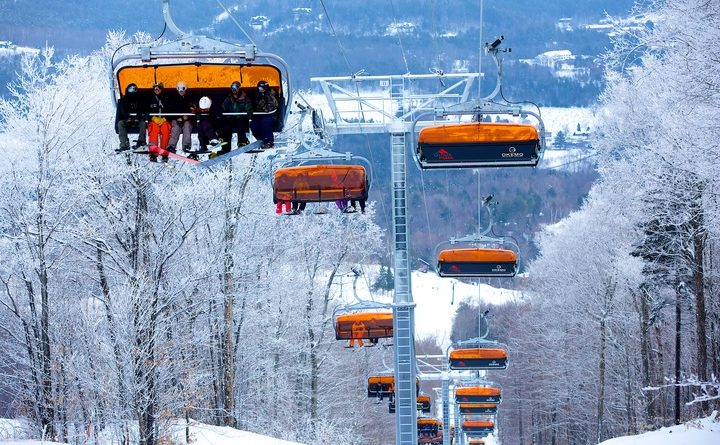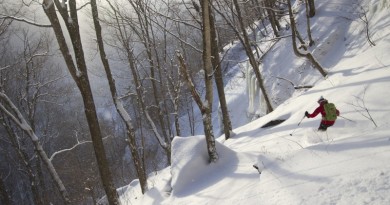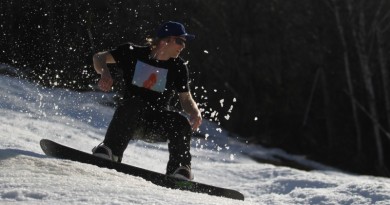Vail Resorts Opts for Wind Power
If you’ve been wondering how Vail Resorts was going to meet its ‘Commitment to Zero,’ and reduce its use of fossil fuels, today’s press release has some answers:
Vail Resorts announced a long-term wind energy contract to purchase the equivalent amount of electricity needed to power 100 percent of its estimated FY 2019 North American operations by 2020. Those operations include the Stowe Mountain and Okemo ski resorts in Vermont. The virtual wind energy will come from the new Plum Creek wind farm in Nebraska.
Additionally, Vail Resorts announced a partnership with Eco-Products to supply all of its North American restaurants with compostable and recycled-content items and eliminate conventional single-use plastics, a process which will begin during the 2018-19 winter season.
“As a growing company, deeply connected to the outdoors, we made a commitment last year to address our most pressing global and environmental challenges and protect our local communities and natural resources,” said Rob Katz, chairman and chief executive officer of Vail Resorts. “Today we are thrilled to announce significant initiatives that will help us achieve our zero net emissions and zero waste to landfill goals, and provide a transparent look at our progress through our first EpicPromise Progress Report.”

The company’s multimillion-dollar wind energy virtual power purchase agreement (VPPA) enables the development of the Plum Creek Wind Project, which is expected to be completed in 2020. Under the 12-year agreement, Vail Resorts is purchasing 310,000 megawatt hours (MWh) annually – enough wind energy to reduce the emissions associated with the company’s estimated FY 2019 North American electricity use by 100 percent, which includes the recent acquisitions of Crested Butte Mountain Resort, Stevens Pass Resort, Okemo Mountain Resort, and Mount Sunapee Resort. That is also the equivalent amount of electricity needed to power 30,000 average U.S. homes each year.
Vail acquired Okemo and the associated Triple Peaks resorts at Crested Butte and Mount Sunapee in September for $74 million. Vail acquired the ski operations at Stowe in June 2017 for $41 million.
The company’s agreement with Lincoln Clean Energy, a subsidiary of Ørsted and a leading developer of U.S. renewables, is the first of its kind to be executed by a Colorado-based company as a buyer and will make Vail Resorts the first major company in the leisure and hospitality industry to achieve 100 percent renewable electricity for its North American electricity load with a VPPA. Schneider Electric Energy & Sustainability Services served as a strategic advisor to Vail Resorts on the selection of the Plum Creek project.
“This agreement is just one of many ways Vail Resorts is working to be an industry leader in preserving the environment by bringing more renewable energy online,” said Katz. “While we continually work with local, state and federal governments and utility partners to find ways to source renewable energy in the markets where our individual resorts are located, this wind power purchase agreement allows us to make a measurable impact on climate change – and its effect on the planet – within just a few years.”
On a local level, Vail Resorts recently signed a contract with Xcel Energy in Colorado to support a new solar energy facility, and is sponsoring Rocky Mountain Power’s request for proposal for 308,000 MWh of renewable energy, which could lead to a significant increase in the amount of solar, wind, and geothermal projects in Utah. Additionally, the Company has invested $2.4 million in energy efficiency projects across its resorts over the last year, including low-energy snowmaking and energy-efficient building upgrades.
The plains states from Texas to Minnesota are investing heavily in wind power. Texas is the largest producer in the US and Iowa has the most production per capita. Smuckers, which owns Dunkin Donuts, is another investor in the Plum Creek project. Facebook, Apple, Microsoft and Walmart are among many large corporations investing in virtual or direct renewable energy projects in the US and around the world.
Vail said in a press release that achieving zero net emissions by 2030 is one pillar within the company’s ‘Commitment to Zero’ sustainability goal, announced by Vail Resorts in 2017. Another pillar is to achieve zero waste to landfill by 2030.
In naming Boulder-based Eco-Products its ‘Official Zero Waste Partner,’ the company is investing heavily in sourcing sustainable guest-facing dining products at all Vail Resorts restaurants across its 17 North American resorts, a process that will begin this winter season. Through this partnership, the company is working to eliminate all single-use, guest-facing conventional plastic products, such as cups, straws, beverage lids, plates, bowls and cutlery, and replacing them with compostable or recycled-content products– a move that’s expected to divert nearly 300 tons of waste from landfills over the next two winter seasons.
To support and accommodate this change, and make measurable progress towards zero waste in 2030, Vail Resorts is working with community partners to identify increased opportunities to recycle and compost. The Company has set aside funding to build out resort-wide composting capabilities – with a full resort diversion project already underway at Park City Mountain in Utah, targeting food scraps and compostable packaging, due to be completed next season and expected to divert more than 400 tons of waste from landfills over the next two winter seasons.
Other zero waste initiatives from Vail Resorts include: expanding a Smart Straw initiative, where compostable straws will be available by request only across all the Company’s North American restaurants; moving to durable products where possible, such as replacing single-use wax paper cups with reusable tumblers everywhere that dishwashing is available (expected to eliminate nearly 300,000 disposable cups this season); using waste-tracking sensors to help better measure current waste streams and identify inefficiencies; and working with graduate students from the University of Colorado Boulder, Masters of the Environment program to conduct waste audits and research to identify opportunities for improvement.
“We are on a journey to re-imagine what it means to be a leader in sustainability by focusing on what’s right for our communities, our mountains and our future,” said Katz. “To succeed, we must rely on our individual and collective participation to ignite a passion for the great outdoors and strong communities for generations to come.”
Today’s sustainability announcements are a part of the 2018 EpicPromise Progress Report from Vail Resorts, an effort to transparently report annually on progress around its “Commitment to Zero” goals as well as its employee and community giving initiatives. More information about the programs outlined in the report can be found at www.epicpromise.com(link is external).
Featured photo: Okemo’s bubble chair, courtesy Okemo Mountain Resort.




